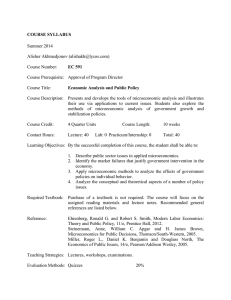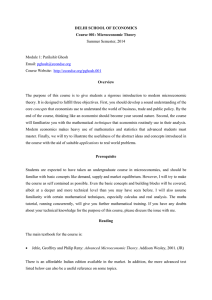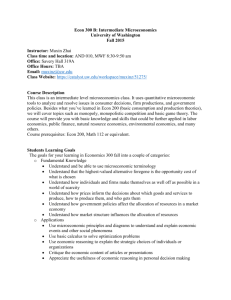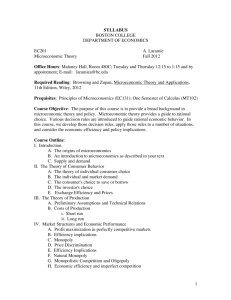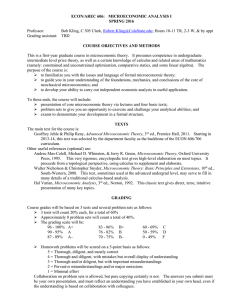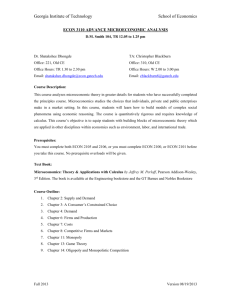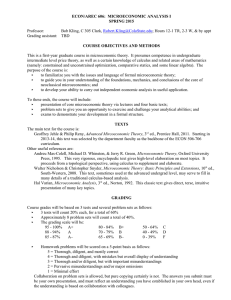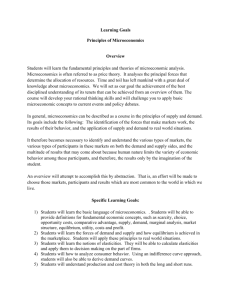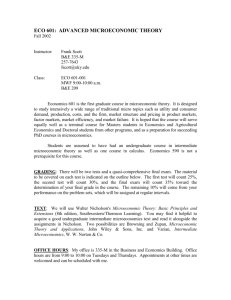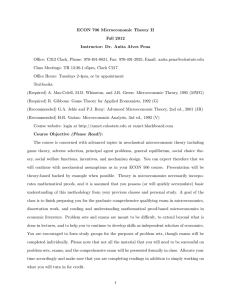ECON 706: Microeconomic Theory Fall 2014 Tuesday and Thursday, 12:30–1:45 Instructor:
advertisement
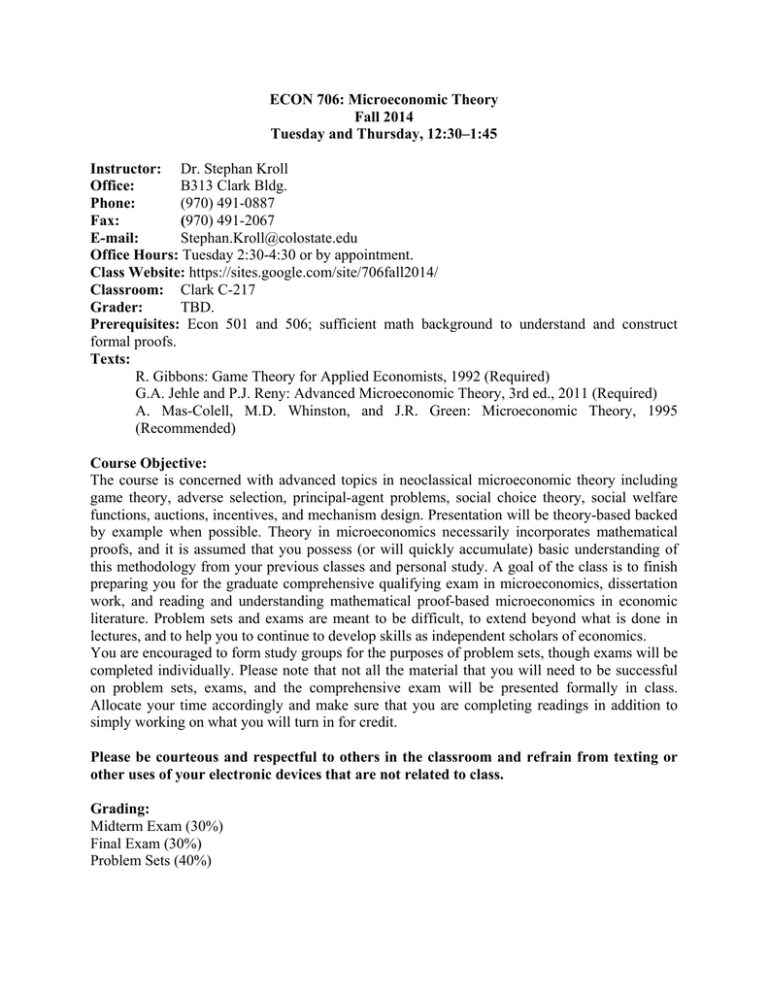
ECON 706: Microeconomic Theory Fall 2014 Tuesday and Thursday, 12:30–1:45 Instructor: Dr. Stephan Kroll Office: B313 Clark Bldg. Phone: (970) 491-0887 Fax: (970) 491-2067 E-mail: Stephan.Kroll@colostate.edu Office Hours: Tuesday 2:30-4:30 or by appointment. Class Website: https://sites.google.com/site/706fall2014/ Classroom: Clark C-217 Grader: TBD. Prerequisites: Econ 501 and 506; sufficient math background to understand and construct formal proofs. Texts: R. Gibbons: Game Theory for Applied Economists, 1992 (Required) G.A. Jehle and P.J. Reny: Advanced Microeconomic Theory, 3rd ed., 2011 (Required) A. Mas-Colell, M.D. Whinston, and J.R. Green: Microeconomic Theory, 1995 (Recommended) Course Objective: The course is concerned with advanced topics in neoclassical microeconomic theory including game theory, adverse selection, principal-agent problems, social choice theory, social welfare functions, auctions, incentives, and mechanism design. Presentation will be theory-based backed by example when possible. Theory in microeconomics necessarily incorporates mathematical proofs, and it is assumed that you possess (or will quickly accumulate) basic understanding of this methodology from your previous classes and personal study. A goal of the class is to finish preparing you for the graduate comprehensive qualifying exam in microeconomics, dissertation work, and reading and understanding mathematical proof-based microeconomics in economic literature. Problem sets and exams are meant to be difficult, to extend beyond what is done in lectures, and to help you to continue to develop skills as independent scholars of economics. You are encouraged to form study groups for the purposes of problem sets, though exams will be completed individually. Please note that not all the material that you will need to be successful on problem sets, exams, and the comprehensive exam will be presented formally in class. Allocate your time accordingly and make sure that you are completing readings in addition to simply working on what you will turn in for credit. Please be courteous and respectful to others in the classroom and refrain from texting or other uses of your electronic devices that are not related to class. Grading: Midterm Exam (30%) Final Exam (30%) Problem Sets (40%) Final grades will be based on the following grade scale based on final percentage: 95-100 A+ 80-84.9 B+ <70 C range or lower 90-94.9 A 75-79.9 B 85-89.9 A70-74.9 B(tentative) Course Outline: Tuesday 1 Thursday 2 3 4 5 6 7 8 Market Power Revisited: Cournot v. Bertrand v. Stackelberg; plus capacity constraints Static/Incomplete 9 10 Dynamic/Incomplete 11 12 Papers 13 14 15 17 16 (Midterm Exam) 18 GT: Ten Treasures and Ten Intuitive Contradictions Recent Topics: QRE, EWA, Behavioral GT Catch-up and Exam Papers 19 20 Externalities and Public Goods Adverse Selection and Principal Agent 21 22 23 24 Auctions, Incentives and Mechanism Design 25 26 Parts of Gibbons + Papers TG Break (11/26 and 11/28) -- -- Week 14 (12/3 and 12/5) Week 15 (12/10 and 12/12) Finals Week 27 28 29 30 Week 1 (8/27 and 8/29) Week 2 (9/3 and 9/5) Week 3 (9/10 and 9/12) Week 4 (9/17 and 9/19) Week 5 (9/24 and 9/26) Week 6 (10/1 and 10/3) Week 7 (10/8 and 10/10) Week 8 (10/15 and 10/17) Week 9 (10/22 and 10/24) Week 10 (10/29 and 10/31) Week 11 (11/5 and 11/7) Week 12 (11/12 and 11/14) Week 13 (11/19 and 11/21) Friday, Dec. 19, 9:4011:40: Final Exam Game Theory: Static Complete GT: Dynamic Complete Social Choice Theory and Welfare Functions Final Exam (cumulative; in the regular classroom) Gibbons 1 Jehle/Reny 7 2 7 Papers, parts of Gibbons and J/R 3 4 7 4 7 Papers 8 9 6
